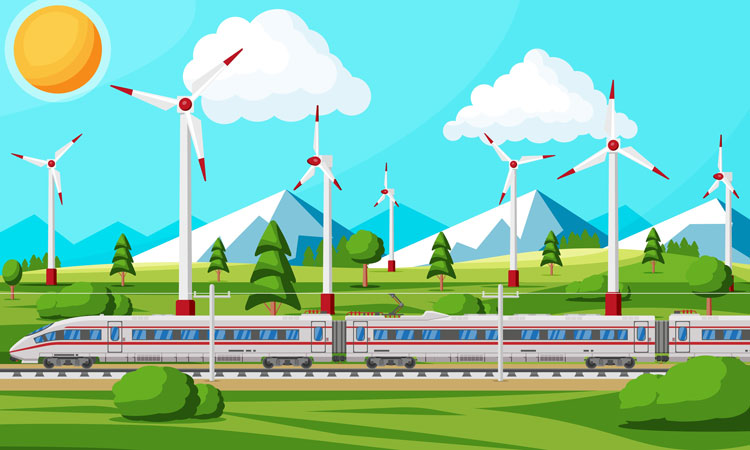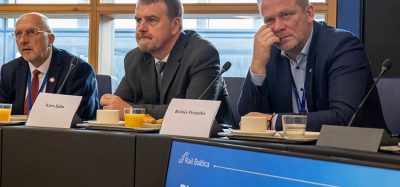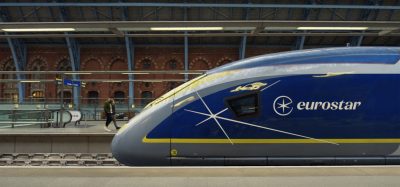Rail industry responds to ‘Fit for 55’ legislative proposals
Posted: 19 July 2021 | Global Railway Review | No comments yet
The European Commission’s ‘Fit for 55’ regulatory package will be crucial in the transition to sustainable mobility in Europe.


On 14 July 2021, the European Commission (EC) adopted a package of proposals to make the European Union’s (EU) climate, energy, land use, transport and taxation policies fit for reducing net greenhouse gas emissions by at least 55 per cent by 2030, compared to 1990 levels.
Achieving these emission reductions in the next decade is crucial to Europe becoming the world’s first climate-neutral continent by 2050 and making the European Green Deal a reality. With these proposals, the EC is presenting the legislative tools to deliver on the targets agreed in the European Climate Law and fundamentally transform our economy and society for a fair, green and prosperous future.
The proposals will enable the necessary acceleration of greenhouse gas emission reductions in the next decade. They combine: application of emissions trading to new sectors and a tightening of the existing EU Emissions Trading System; increased use of renewable energy; greater energy efficiency; a faster roll-out of low emission transport modes and the infrastructure and fuels to support them; an alignment of taxation policies with the European Green Deal objectives; measures to prevent carbon leakage; and tools to preserve and grow our natural carbon sinks.
Achieving these emission reductions in the next decade is crucial to Europe becoming the world’s first climate-neutral continent by 2050 and making the European Green Deal a reality.
President of the EC, Ursula von der Leyen, said: “The fossil fuel economy has reached its limits. We want to leave the next generation a healthy planet as well as good jobs and growth that does not hurt our nature. The European Green Deal is our growth strategy that is moving towards a decarbonised economy. Europe was the first continent to declare to be climate neutral in 2050, and now we are the very first ones to put a concrete roadmap on the table. Europe walks the talk on climate policies through innovation, investment and social compensation.”
Commissioner for Transport, Adina Vălean, said: “With our three transport-specific initiatives – ReFuel Aviation, FuelEU Maritime and the Alternative Fuels Infrastructure Regulation – we will support the transport sector’s transition into a future-proof system. We will create a market for sustainable alternative fuels and low-carbon technologies, while putting in place the right infrastructure to ensure the broad uptake of zero-emission vehicles and vessels. This package will take us beyond greening mobility and logistics. It is a chance to make the EU a lead-market for cutting-edge technologies.”
What does this mean for the European rail industry?
Rail transport is already Green Deal compliant from the 2030 perspective. It is, responsible for just 0.4 per cent of transport-caused CO2 emissions, despite having a share of eight per cent of passenger transport and 19 per cent of freight transport across Europe.
For that reason, a modal shift from carbon-intensive modes to rail is the most effective way to decarbonise transport in large parts of the EU’s territory, as highlighted in the recent Council Conclusions adopted by EU Transport Ministers in June 2021.
…a modal shift from carbon-intensive modes to rail is the most effective way to decarbonise transport in large parts of the EU’s territory…
The proposals provide a basis for implementing EU-wide carbon pricing for transport. Accompanied, particularly in the short-term, by other policies on improving vehicle efficiency and a switch to low-carbon fuels, the ‘Fit for 55’ package will support carbon pricing’s key effects and provide a real chance of closing the GHG emission gap. This is needed all the more in the current context for a green recovery following the COVID-19 pandemic.
The Community of European Railway and Infrastructure Companies (CER) Executive Director, Alberto Mazzola, said: “European railways fully support the goal to make Europe’s continent a zero emitter by 2050. Railways are already on the path to reduce their emission by 55 per cent by 2030 and to become a zero emitter before 2050. Modal shift will further accelerate the reduction of European emissions. The polluter pays principles will work only with a robust carbon price applied to all transport modes. And revenues from carbon pricing must be allocated to further develop low-carbon transport systems and protect EU citizens from energy poverty. I am happy to announce the CER fact sheet on carbon pricing as a tool for delivering sustainable mobility. CER will now detail its proposals to increase the climate ambition and contribute towards making transport fit for 55.”
Also reacting to the proposal was UNIFE‘s Director General, Philippe Citroën, who commented: “‘Fit for 55’ sets a sustainability roadmap for Europe which its rail supply industry supports and have already begun to quickly pursue. Our sector is already on-track to meet the Climate Law’s 2030 objectives. These proposals introduce new opportunities for the market uptake of clean technologies in rail and fairer pricing across transport modes. European rail manufacturers are ready to step up their commitments to citizens, the environment and our planet.”
Colleagues from the European Rail Freight Association (ERFA) also voiced their opinions. President, Dirk Stahl, commented: “We welcome the recently published ‘Fit for 55 Package’ which will look to introduce climate, energy, land use, transport and taxation policies fit for reducing net greenhouse gas emissions by at least 55% by 2030. It is no surprise that rail does not feature predominately in the package, given rail’s existing green credentials, but we must not lose sight that rail remains a key part of the solution”
ERFA Secretary General, Conor Feighan, said: “We now have a clear understanding of the European Commission’s legislation objectives for the coming years as communicated in this month’s ‘Fit For 55’ package and last December’s ‘Sustainable and Smart Mobility Strategy’. It is now important that these strategies are followed up with ambitious legislative proposals which will assist in meeting the objectives they have already set out.”
François Davenne, UIC Director General, said: “The UIC, in its role as a global association of railway companies, has fully mobilised to provide concrete and effective solutions to make a massive modal shift towards rail desirable. The ‘Fit for 55’ package and ETS revision will support this shift with a move towards levelling the tax burden for all transport modes. We all know that climate change is ongoing. Our actions will mitigate its effects, but we will have to live with uncertainty, confronted with non-linear phenomena that will have consequences for transport infrastructure and life as we know it. In this difficult period, we must shift to low-emission transport modes. Railways are part of the solution – while representing around 10 per cent of the market, they contribute less than three per cent of global emissions. Furthermore, society is benefitting from the improved efficiency and inclusiveness offered by the railways, as well as reduced road fatalities, injuries and local air pollution.”
François added: “The priority for our sector is to choose to finance transformational projects for railways at regional and global level. Transformational projects are those that will have a major impact on efficiency in the short-term, such as digitalisation, seamless interconnection with other modes and capacity increases on existing infrastructure. These projects will serve as a driver of modal shift to rail and public transport in order to achieve the objectives of the United Nations Sustainable Development Goals and the Green Deal in Europe.”
Related topics
Related organisations
Community of European Railway and Infrastructure Companies (CER), European Commission (EC), European Rail Freight Association (ERFA), European Union (EU), International Union of Railways (UIC), UNIFE (the European Rail Supply Industry)
Related regions
Related people
Adina Vălean, Alberto Mazzola, Conor Feighan, Dirk Stahl, François Davenne, Philippe Citroën, Ursula von der Leyen







